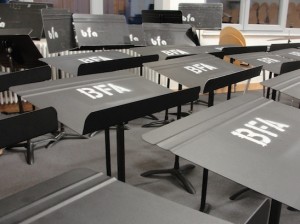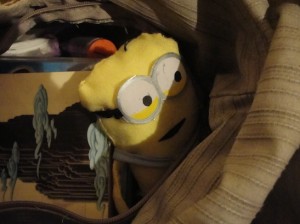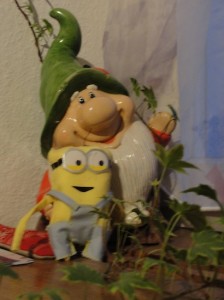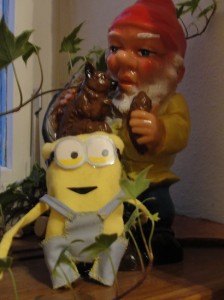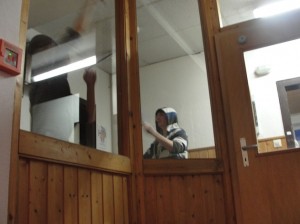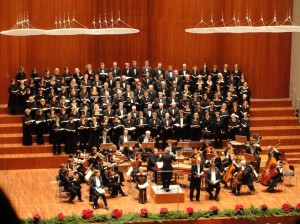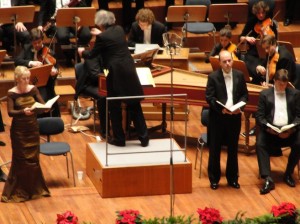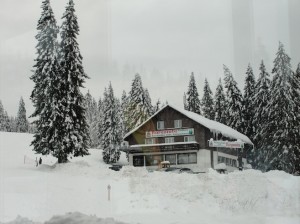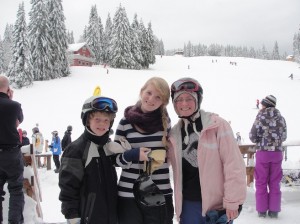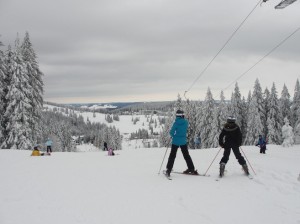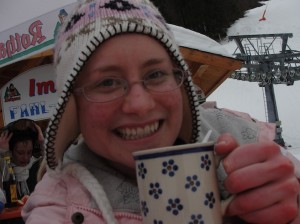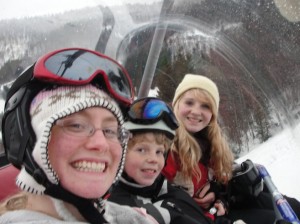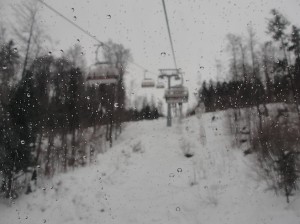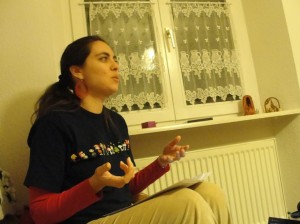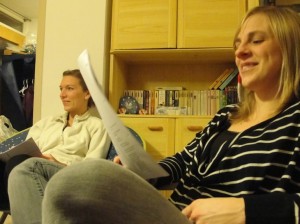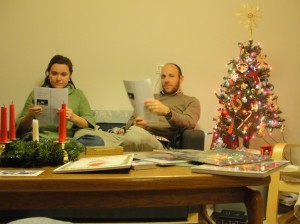If you’re in a hurry, here’s the short version of the story (otherwise skip ahead): I went to Izmir for a renewal conference plus a tour of the ruins of ancient Ephesus. I celebrated the new year by jumping into the Aegean Sea; this was my first experience swimming in salt water. After the conference, several of us went to Istanbul for sight-seeing. Highlights included seeing the sultan’s palace, drinking coffee and tea while chatting with Kurdish rug salesmen, and making a new friend on the plane ride home.
If you have time to read it, here’s the long version:
Izmir: Ephesian Escape
Location, Culture, & History:
My sending organization had a renewal conference near Izmir, Turkey for workers in Europe and the Middle East. It was an appropriate location for a Christian conference; Izmir is the modern name for the biblical Smyrna. We had our conference smack dab in the middle of the 7 churches of Revelation 2 & 3!
On my way to Istanbul, my seat was next to a Turkish man who had been living in Switzerland for 40 years. His English wasn’t great, so I ended up talking to him in German about the Turkish language! I learned how to pronounce each of the letters.
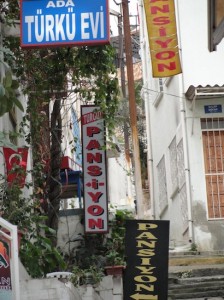 In the 1920s, Atatürk reformed Turkey to make it more westernized. Those reforms impacted the written language. Turkish is written in a Latin script and everything is basically spelled phonetically.
In the 1920s, Atatürk reformed Turkey to make it more westernized. Those reforms impacted the written language. Turkish is written in a Latin script and everything is basically spelled phonetically.
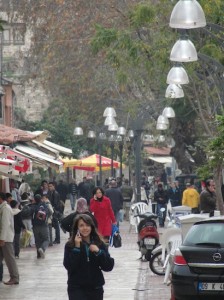 Turkey has a rich history, from Greek and Roman conquerers to Alexander the Great to Byzantine rule to the Ottomans. Its Islamic tradition has been westernized as well as mixed with ancient superstition. This mixed history displayed itself in a cemetery in Kuşadası (pron. koo-SHA-da-suh), the city nearest to our hotel.
Turkey has a rich history, from Greek and Roman conquerers to Alexander the Great to Byzantine rule to the Ottomans. Its Islamic tradition has been westernized as well as mixed with ancient superstition. This mixed history displayed itself in a cemetery in Kuşadası (pron. koo-SHA-da-suh), the city nearest to our hotel.
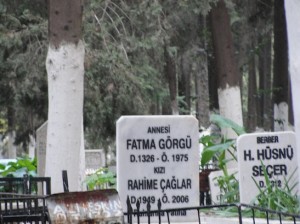 You may be wondering how someone could be born in 1326 and die in 1975. The answer: Before Atatürk’s reforms, Turkey followed the Muslim calendar. He put Turkey on the Western calendar system!
You may be wondering how someone could be born in 1326 and die in 1975. The answer: Before Atatürk’s reforms, Turkey followed the Muslim calendar. He put Turkey on the Western calendar system!
On the bus back to the hotel, I met a German couple who happened to be staying in the same hotel. The man plays violin! He said if he ever travels to Basel, we should meet up and play chamber music. My trip to Turkey revealed to me that I no longer feel that Germany is a foreign country. Turkey felt foreign, but when I heard the couple speaking German, I felt drawn to them because they were familiar!
Ephesian Escape Conference:
After exploring Kuşadası, it was time for the conference to start. Sessions were held in our hotel, which Dougg Custer claimed was a middle-of-the-road quality hotel. I was not convinced. It looked like a rich person’s resort, though we paid a very reasonable rate to stay there. Hotel on the Aegean Sea:
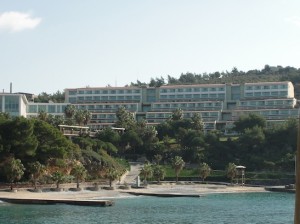 The view from my room:
The view from my room:
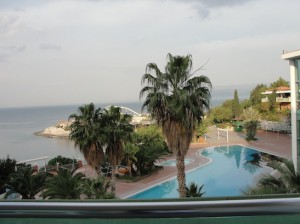 We had worship sessions each morning and workshops in the afternoon. We had an informational session on the history of Ephesus (fascinating stuff – that could be a whole post by itself!), a very appropriate session entitled “Rest: God’s Design for His People or… How come we break the 4th commandment?” Workshops included “The Role of Prayer in Ministry,” “Understanding & Reaching Postmodern Youth,” and “The Churches of Revelation.” For me, the session that impacted me the most was our final wrap-up and charge. Dougg Custer gave examples of leadership from the Civil War. He reminded us that as leaders, we often need to motivate our charges by bringing them above the details of daily work and remind them of the goal, the vision. I’m going to take some time this week to just ponder what my vision is for the BFA orchestra and consider how I can best communicate that vision to the students. I am especially concerned about the high school orchestra, which has still been struggling because they have been rehearsing separately in small groups. They lack unity, motivation, and vision.
We had worship sessions each morning and workshops in the afternoon. We had an informational session on the history of Ephesus (fascinating stuff – that could be a whole post by itself!), a very appropriate session entitled “Rest: God’s Design for His People or… How come we break the 4th commandment?” Workshops included “The Role of Prayer in Ministry,” “Understanding & Reaching Postmodern Youth,” and “The Churches of Revelation.” For me, the session that impacted me the most was our final wrap-up and charge. Dougg Custer gave examples of leadership from the Civil War. He reminded us that as leaders, we often need to motivate our charges by bringing them above the details of daily work and remind them of the goal, the vision. I’m going to take some time this week to just ponder what my vision is for the BFA orchestra and consider how I can best communicate that vision to the students. I am especially concerned about the high school orchestra, which has still been struggling because they have been rehearsing separately in small groups. They lack unity, motivation, and vision.
One of the highlights of the conference was the tour of ancient Ephesus.
Agora:
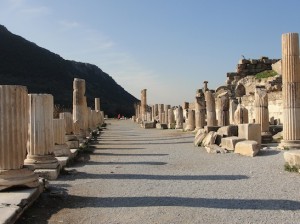 Our unofficial tour guide Ed Gudeman:
Our unofficial tour guide Ed Gudeman:
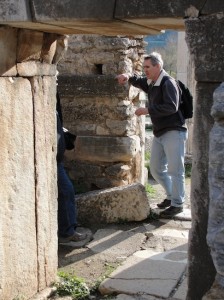 Main Street Ephesus with the famous library:
Main Street Ephesus with the famous library:
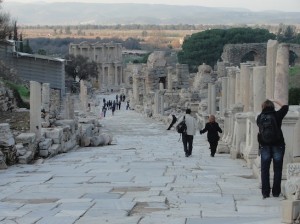 Read through Acts 19-20 to see what took place at this theater:
Read through Acts 19-20 to see what took place at this theater:
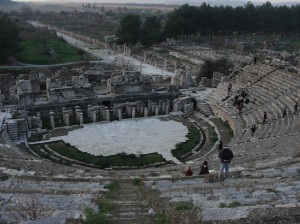 We also visited St. John’s Basilica, where the beloved disciple is supposed to be buried:
We also visited St. John’s Basilica, where the beloved disciple is supposed to be buried:
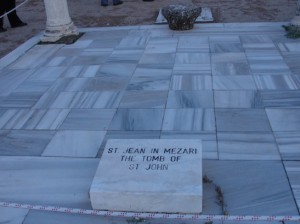 Our last stop was the ruin of Artemis’ temple. Archaeologists couldn’t even put together a single pillar, so they combined a few to make one.
Our last stop was the ruin of Artemis’ temple. Archaeologists couldn’t even put together a single pillar, so they combined a few to make one.
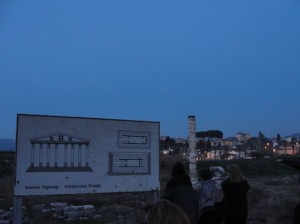 Fun things:
Fun things:
We had the WV Talent Show on New Year’s Eve. Talents ranged from poetry recitation (my favorite being the reading of Justin Bieber’s “Oh Baby”) to music to robotics.
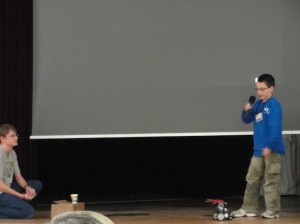 Every time someone found out I played violin, they would ask me if I was going to play in the talent show. One problem: I didn’t bring my violin. I did, however, bring my iPod, so I decided to give them a little “air violin” show. I “played” about 5 minutes of the Brahms violin concerto, complete with foot stamping and hair flying!
Every time someone found out I played violin, they would ask me if I was going to play in the talent show. One problem: I didn’t bring my violin. I did, however, bring my iPod, so I decided to give them a little “air violin” show. I “played” about 5 minutes of the Brahms violin concerto, complete with foot stamping and hair flying!
We watched performances until midnight, at which time we celebrated the arrival of 2011! It was fantastic to be able to celebrate the new year with my WorldVenture family.
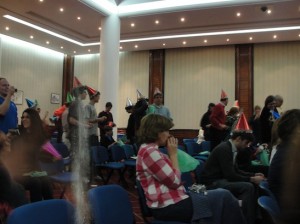 Substitute fireworks:
Substitute fireworks:
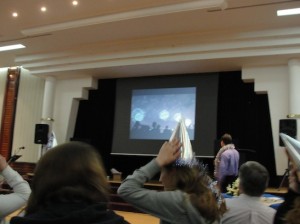 On January 1, I decided I needed to do a “first” in my life. I had never been swimming in salt water before, so I decided to jump into the Aegean Sea. The verdict: it was cold, wet, and salty. I think I would enjoy it more if it were warmer.
On January 1, I decided I needed to do a “first” in my life. I had never been swimming in salt water before, so I decided to jump into the Aegean Sea. The verdict: it was cold, wet, and salty. I think I would enjoy it more if it were warmer.
Istanbul: Wonderful Wanderings
I flew into Istanbul with the Custers. A bunch of WorldVenture people were staying at the Orka Royal hotel for some meetings, so I stayed there with them (it wouldn’t really be safe to travel alone).
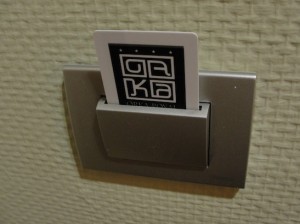 These room keys are special: you put them in the little key holder as soon as you walk in the room. The lights don’t turn on if it’s not in there. It’s a good way of saving energy and keeping track of your key!
These room keys are special: you put them in the little key holder as soon as you walk in the room. The lights don’t turn on if it’s not in there. It’s a good way of saving energy and keeping track of your key!
I made plans to explore the city with the Burnell family the next day. They’re working in Poland, but their son Daniel is a student at BFA. The Burnells’ daughter was sick that day, so I ended up wandering around with the guys of the family: Joel (father), Daniel Joel, and Erik David. If you know the names of the men in my family, you might find this a funny coincidence!
Our first stop was the Sultan’s palace.
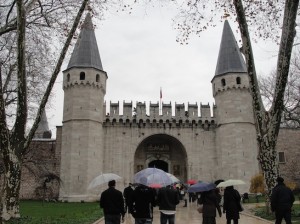 Daniel and Erik:
Daniel and Erik:
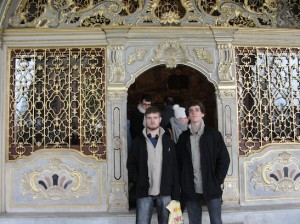 We walked by the Haggia Sophia (Byzantine era church):
We walked by the Haggia Sophia (Byzantine era church):
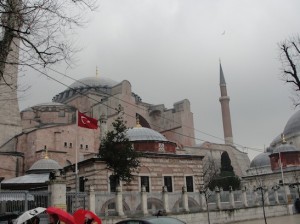 Then visited the Blue Mosque:
Then visited the Blue Mosque:
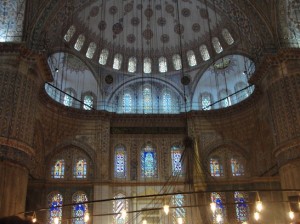 On our way out, a rug salesman invited us to his shop. We all sat down and talked. He served us Turkish coffee and apple tea. Conversation flowed from various topics such as ethics, culture, politics, religion, etc. Turks are very willing to sit down and converse civilly over a cup of tea; Joel was able to explain the Trinity, correcting this man’s misconception that it is God, Jesus, and Mary.
On our way out, a rug salesman invited us to his shop. We all sat down and talked. He served us Turkish coffee and apple tea. Conversation flowed from various topics such as ethics, culture, politics, religion, etc. Turks are very willing to sit down and converse civilly over a cup of tea; Joel was able to explain the Trinity, correcting this man’s misconception that it is God, Jesus, and Mary.
Next we went to the Basilica cisterns:
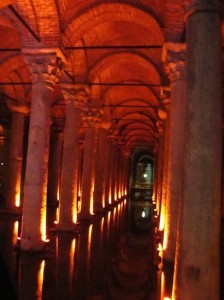
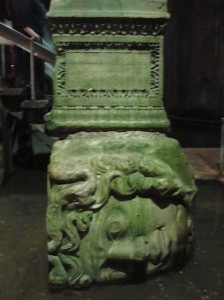 Then we went to the Grand Bazaar. Daniel helped me barter for some little coin purses and a nice bag. It could be a little overwhelming with all the men selling their wares, but I discovered that if you don’t look at their stuff, they don’t try to sell it to you. I was expecting them to be more aggressive and pushy, but they really weren’t.
Then we went to the Grand Bazaar. Daniel helped me barter for some little coin purses and a nice bag. It could be a little overwhelming with all the men selling their wares, but I discovered that if you don’t look at their stuff, they don’t try to sell it to you. I was expecting them to be more aggressive and pushy, but they really weren’t.
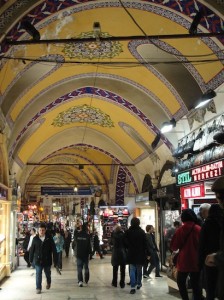 After a short rest at the hotel, Daniel and I wandered across the bridge to another section of the city. Our wandering reminded me of the time David and I wandered around Innsbruck one night. Here’s a look back at the Blue Mosque:
After a short rest at the hotel, Daniel and I wandered across the bridge to another section of the city. Our wandering reminded me of the time David and I wandered around Innsbruck one night. Here’s a look back at the Blue Mosque:
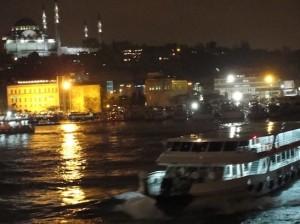 We found a music shop and I played a couple cheap violins. As I tuned up the severely out-of-tune instrument, the other people in the shop were staring at me, waiting to hear me play. Though feeling slightly awkward, I ignored them. Daniel played something on the piano and I improvised something to go with it; when we finished, the onlookers applauded! This reminded me of the time I played a gypsy street performer’s violin-trumpet in Bruges.
We found a music shop and I played a couple cheap violins. As I tuned up the severely out-of-tune instrument, the other people in the shop were staring at me, waiting to hear me play. Though feeling slightly awkward, I ignored them. Daniel played something on the piano and I improvised something to go with it; when we finished, the onlookers applauded! This reminded me of the time I played a gypsy street performer’s violin-trumpet in Bruges.
Though it was a short trip to Istanbul, I enjoyed it. I’ll have to go back again some day and explore some more!
On my return flight to Basel, I sat next to a French lady from Mulhouse (town in France right next to Basel). We had the most interesting conversation! She has lived in Brussels, England, Brazil, and now France, so she has gained a lot of perspective from life experiences. We discussed helping people (you have to follow through otherwise it hurts them in the long run), trying to understand and live with people (marriage and difficulties that come with that), suffering (her grandparents died in a Nazi concentration camp; her parents abandoned religion).
We got to talking about God, Heaven, reincarnation, and other things. I was asking her what she thought (she believes in a God and thinks that if you’re good enough you’ll get into heaven), and eventually she asked what I thought. I explained that God is the one who created the rules (10 Commandments for example) to get into Heaven, but we’ve all broken them. Nobody is perfect, so nobody can get into Heaven. But Jesus was the only one who lived a perfect life, and by believing in Him we can share in His perfection. She said she thought Jesus didn’t know about how bad people could be – surely he wouldn’t have died for anyone as bad as the Nazis who killed ruthlessly. I described crucifixion and how it is thought to be the most painful way of dying possible. As Jesus hung there on the cross with the nails in His hands and feet, with the skin on his back stripped off from the flogging, his lungs filling with fluid, He felt the pain of the world. And yet in that moment, He prayed, “Father forgive them, for they know not what they do.” If He was able to pray to forgive those who inflicted the most horrible pain on Him, surely He could forgive anyone that turns to Him and asks for forgiveness.
In the course of our conversation, I found out that she has a rare disease that leaves her in constant pain because her muscles harden around the nerves; she will eventually die of a heart failure. She thinks God allowed her to have this disease because she can cope with it; other people are not strong enough to handle it. She also thinks it may be that she did something bad in a previous life. My description of Jesus’ pain seemed to really hit home for her; at the time, I didn’t know about her disease.
At the end of the flight she asked for my phone number and promised to have me over for cake some time. I’m praying that we will be able to continue our conversation and that God will speak to her and show her His Truth!
 If you zoom in really close, you’ll see that the person in the picture is about to eat a grasshopper. I heard some girls exclaiming, “Eeww! That is so gross!” as they meandered down the hall and examined Gustav’s latest “decoration.”
If you zoom in really close, you’ll see that the person in the picture is about to eat a grasshopper. I heard some girls exclaiming, “Eeww! That is so gross!” as they meandered down the hall and examined Gustav’s latest “decoration.”
